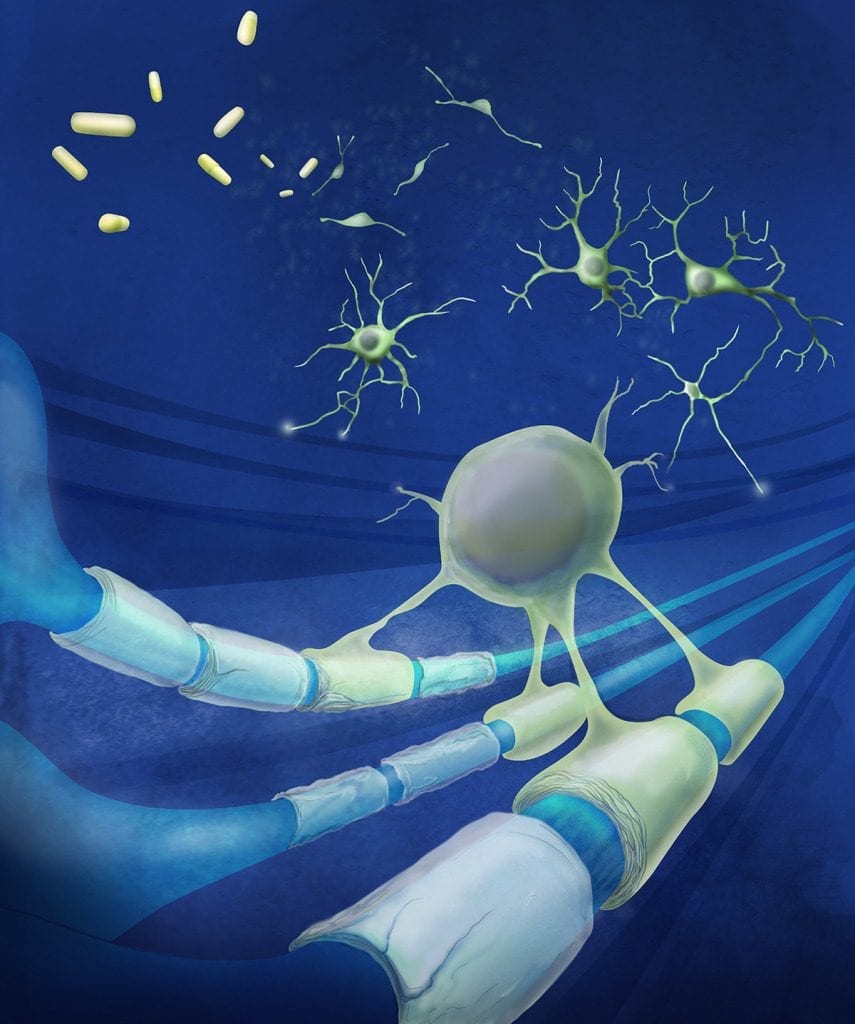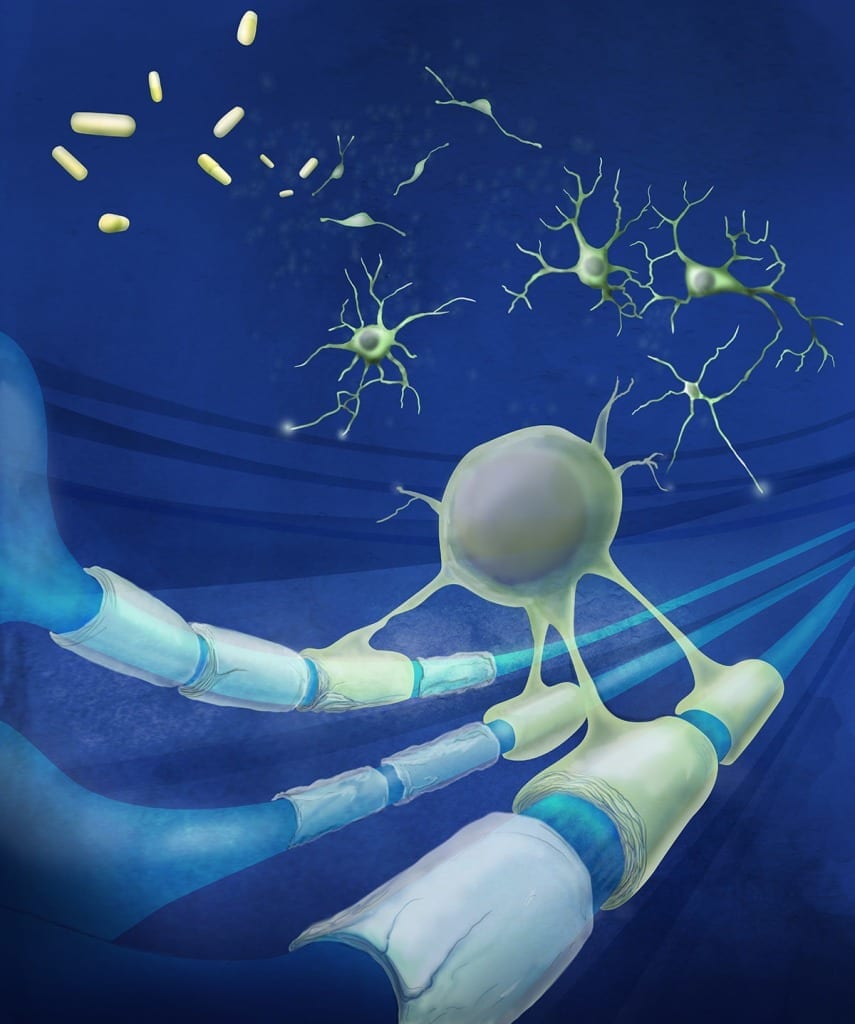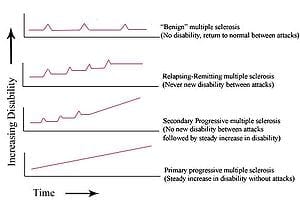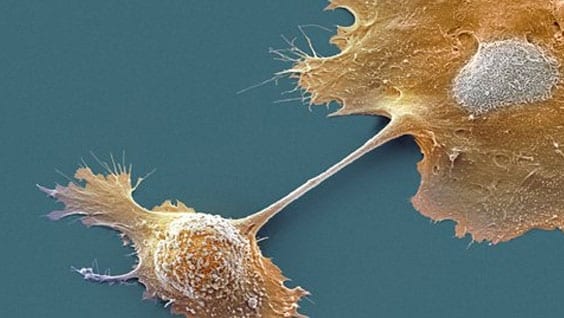
Approach may offer new way to reverse disability in multiple sclerosis patients
A pair of topical medicines already alleviating skin conditions may prove to have another, even more compelling use: instructing stem cells in the brain to reverse damage caused by multiple sclerosis.
Led by researchers at Case Western Reserve University, a multi-institutional team used a new discovery approach to identify drugs that could activate mouse and human brain stem cells in the laboratory. The two most potent drugs—one that currently treats athlete’s foot, and the other, eczema—were capable of stimulating the regeneration of damaged brain cells and reversing paralysis when administered systemically to animal models of multiple sclerosis. The results were published online (dx.doi.org/10.1038/nature14335) Monday, April 20, in the scientific journalNature.
“We know that there are stem cells throughout the adult nervous system that are capable of repairing the damage caused by multiple sclerosis, but until now, we had no way to direct them to act,” said Paul Tesar, the Dr. Donald and Ruth Weber Goodman Professor of Innovative Therapeutics, and associate professor in the Department of Genetics & Genome Sciences at the Case Western Reserve School of Medicine. “Our approach was to find drugs that could catalyze the body’s own stem cells to replace the cells lost in multiple sclerosis.”
The findings mark the most promising developments to date in efforts to help the millions of people around the world who suffer from multiple sclerosis. The disease is the most common chronic neurological disorder among young adults, and results from aberrant immune cells destroying the protective coating, called myelin, around nerve cells in the brain and spinal cord.
Without myelin, neural signals cannot be transmitted properly along nerves; over time, a patient’s ability to walk, hold a cup or even see is inexorably eroded. Current multiple sclerosis therapies aim to slow further myelin destruction by the immune system, but the Case Western Reserve team used a new approach to create new myelin within the nervous system. Their work offers great promise of developing therapies that reverse disabilities caused by multiple sclerosis or similar neurological disorders.
“To replace damaged cells, much of the stem cell field has focused on direct transplantation of stem cell-derived tissues for regenerative medicine, and that approach is likely to provide enormous benefit down the road,” said Tesar, also a New York Stem Cell Foundation Robertson Investigator and member of the National Center for Regenerative Medicine. “But here we asked if we could find a faster and less invasive approach by using drugs to activate native stem cells already in the adult nervous system and direct them to form new myelin. Our ultimate goal was to enhance the body’s ability to repair itself.”
Tesar emphasized that much work remains before multiple sclerosis patients might benefit from the promising approach. Scientists still must find ways to transform the topical medications for internal use and determine their long-term efficacy and potential side effects. That said, using existing, federally approved drugs enhances the likelihood that the compounds can be made safe for human use.
Read more: Drugs stimulate body’s stem cells to replace the brain cells lost in multiple sclerosis
The Latest on: Multiple Sclerosis
[google_news title=”” keyword=”Multiple Sclerosis” num_posts=”10″ blurb_length=”0″ show_thumb=”left”]
via Google News
The Latest on: Multiple Sclerosis
- Finley siblings share their fight against Multiple Sclerosis, encourages people to get checkedon April 30, 2024 at 7:33 am
According to the National Multiple Sclerosis Society, almost one million Americans live with Multiple Sclerosis (MS), an auto-immune condition that affects the central nervous system. According to ...
- ‘Liquid gold’ could bring new hope to multiple sclerosis patients, study suggests: ‘Profound benefit’on April 30, 2024 at 2:30 am
An experimental medication called CNM-Au8 — a drinkable liquid with gold nanocrystals — has shown promising results in clinical trials for improving MS symptoms. Doctors and researchers weighed in.
- Multiple sclerosis discovery could be a breakthroughon April 29, 2024 at 5:00 pm
We’ve made significant progress in developing better treatments for multiple sclerosis over the past two decades. Yet the medical community still struggles to diagnose the neurological condition, let ...
- Lisa Jarvis: This multiple sclerosis discovery could be a breakthroughon April 29, 2024 at 10:43 am
We’ve made significant progress in developing better treatments for multiple sclerosis over the last two decades. Yet the medical community still struggles to diagnose the neurological condition, let ...
- Hundreds walk in De Pere to raise awareness for Multiple Sclerosison April 28, 2024 at 9:47 am
Hundreds gathered at West De Pere High School to raise awareness for those who have been diagnosed with Multiple Sclerosis. Whether they were supporting a family member or friends, everyone who walked ...
- ‘You wouldn’t know I had it,’ woman living with Multiple Sclerosis holding awareness walkon April 26, 2024 at 6:44 pm
Happening at 9 a.m. on April 27, a walk to raise funds for the National Multiple Sclerosis Society is happening at Capaha Park ...
- Texas MS 150 bike ride for multiple sclerosis fight to raise millionson April 26, 2024 at 2:55 pm
Texas MS150 is gearing up to celebrate its 40th anniversary as thousands of cyclists raise millions of dollars for the fight against Multiple Sclerosis.
- Multiple Sclerosis Research Newson April 25, 2024 at 5:00 pm
Jan. 9, 2024 — A combination of only 11 proteins can predict long-term disability outcomes in multiple sclerosis (MS) for different individuals. The identified proteins could be used to tailor ...
- Tiziana Life Sciences Announces Additional Clinical Improvements Among Multiple Sclerosis Patients in its Expanded Access Programon April 22, 2024 at 4:12 am
All Patients Have Either Stabilized or Improved on Nasal Foralumab Treatment and No Patients Declined in Key Clinical Measures NEW YORK, April 22, 2024 (GLOBE NEWSWIRE) -- Tiziana Life Sciences, Ltd.
- This Multiple Sclerosis Discovery Could Be a Breakthroughon April 20, 2024 at 5:00 am
A new blood test reveals signs of the disease years before symptoms occur. It could change how MS is diagnosed, treated and studied.
via Bing News











